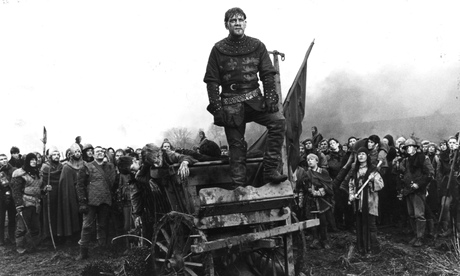
Henry V (1599) by William Shakespeare
The playwright’s third go at the war, after writing or co-writing Henry VI part 1 and Edward III when young, is less jingoistic, more nuanced; and so the character of Henry had to be simplified in Laurence Olivier’s patriotic 1944 film.
The White Company (1891) by Arthur Conan Doyle
Of all his works, Doyle was proudest of this bestselling tale of freebooting English archers in the 1360s, now oddly commemorated only by lending its name to the candles-to-cushions retail chain, but formerly much admired by fans of his historical fiction such as the soldier-statesmen Churchill, Eisenhower and Theodore Roosevelt. Did his motley band of brothers help to inspire Roosevelt’s Rough Riders seven years later?
Saint Joan (1924) by George Bernard Shaw
In contrast to the hostile caricatures of Joan of Arc by Shakespeare (as La Pucelle in Henry VI part 1) and Voltaire (in his scurrilous poem “The Maid of Orleans”), Shaw portrays her downfall and execution as a tragedy in his play centred on her trial; though (like Dreyer’s 1928 film The Passion of Joan of Arc) it reflects her canonisation in 1920, the preface provocatively calls her “one of the first Protestant martyrs”.
The Iron King (1955) by Maurice Druon
The first book of a French hundred years war sequence – Les Rois Maudits (The Accursed Kings) – that was a key inspiration for George RR Martin, as he acknowledged in a My Hero tribute in Review: “the Starks and the Lannisters have nothing on the Capets and Plantagenets … Druon’s epic is the original game of thrones”. After two French versions, an American TV adaptation is in the works.
Blood Red, Sister Rose (1974) by Thomas Keneally
Eight years before Schindler’s Ark, the docu-fiction specialist depicted Joan of Arc, here called Jehanne, as a mixture of prophet, nagging radical and proto-feminist “she soldier” in a version of the 1420s offering parallels with the 1970s. Other writers drawn to Joan include Christine de Pisan, Schiller, Twain, Brecht, Anouilh and, as librettist (for Honegger’s oratorio Joan of Arc at the Stake), Claudel.
Timeline (1999) by Michael Crichton
A professor becomes stuck in medieval France after time-travelling to 1357; his students follow to rescue him but are captured by a knight. Other sci-fi visits to the era – Time Bandits, Bill and Ted’s Excellent Adventure – have been more fleeting.
A Knight’s Tale (2001), written and directed by Brian Helgeland
About jousting rather than real conflict, but the early part of the war is its backdrop and the characters include the Black Prince, who inflicted defeats on the French at Crecy and Poitiers in the 1340s and 50s, and Geoffrey Chaucer, who fought and was captured in the siege of Rheims in 1360. Unlike his creator, however, the Knight in The Canterbury Tales somehow steered clear of fighting France.
World Without End (2007) by Ken Follett
The recently televised medieval epic includes an extended section on the English victory at Crecy, where its visionary heroine Caris nurses the wounded.
Azincourt (2008) by Bernard Cornwell
Though better-known for his Napoleonic (the Sharpe series) and Saxon (currently adapted as The Last Kingdom on BBC2) historical war fiction, Cornwell has also written a 14th-century series, with this bloody, anti-romantic revisiting of Agincourt as a kind of coda. Like his fellow soldiers, its archer hero is in France to kill Frenchmen (not to gain the airy glory promised by Shakespeare’s Henry V), with plunder as a bonus.

